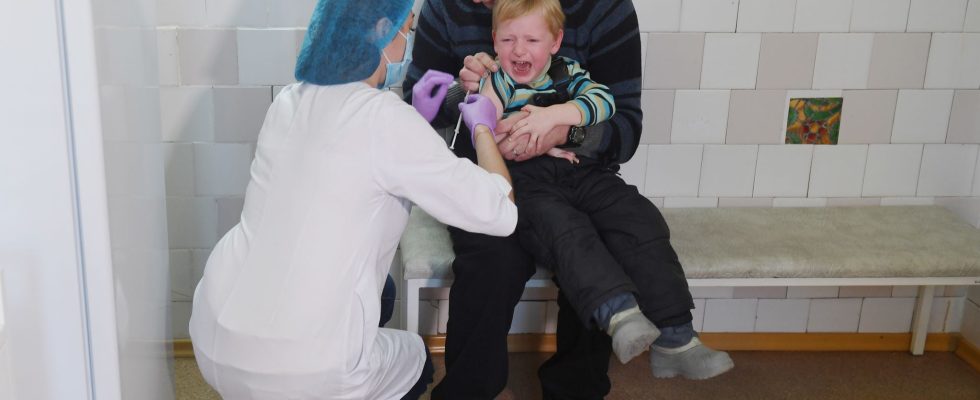What if the fight against Covid-19 had prevented the fight against measles? In 2021, the World Health Organization (WHO) assured that sixty mass vaccination campaigns were suspended in 50 countries, exposing “About 228 million people, mainly children, suffer from diseases such as measles, yellow fever and polio.” At the time, certain alerts were ignored, swept away by the health emergency linked to the coronavirus.
Result: between 2020 and 2022, more than 1.8 million infants in Europe have not been vaccinated against measles. “The pandemic has put a drastic brake on all vaccination campaigns, whether for measles or poliomyelitis. This is the consequence of confinement, the reorientation of budgets and the tension in health systems… As well as the loss of confidence in health authorities”, analyzes Anne Sénéquier, co-director of the Global Health Observatory at the Institute of International and Strategic Relations (Iris), and author of Simply Geopolitics (Eyrolles editions).
Vaccination coverage therefore lost ground during the Covid-19 years. Faced with this observation, the European branch of the World Health Organization (WHO) called, on Tuesday January 23, for the intensification of campaigns to raise awareness among unprotected communities. And time is running out: the number of cases has exploded in 2023 in Europe, compared to the previous year. For the whole year, 42,200 cases were recorded in 41 of the 53 member countries of the region, which extends to Central Asia. A number 45 times higher than the previous year, when 941 cases were reported, according to the WHO. Kazakhstan and Russia are at the top of the most affected countries, with more than 10,000 cases each. “The war in Ukraine and the forgotten conflicts that we do not talk about also impact vaccination campaigns,” estimates Anne Sénéquier.
“In France, the habit of minimizing the perception of measles”
Over the first ten months of 2023, “we have seen in the region not only a 30-fold increase in cases, but also nearly 21,000 hospitalizations and five deaths linked to measles. This is worrying,” said the regional director. of WHO Hans Kluge. With 183 cases, the United Kingdom is the country in Western Europe where the resurgence of the disease, considered to be eliminated in 2021, is the most obvious.
France, which benefits from vaccination coverage among infants close to the objective to be achieved to eliminate the disease, will have just over a hundred cases in 2023, according to unconsolidated data. “In France, we have the habit of (wrongly) minimizing the perception of measles. This is not the case everywhere: you just have to see how measles is treated in American medical series. It is perceived as a very serious illness,” indicates Anne Sénéquier.
This highly contagious viral disease can cause fatal complications and is spread through the air. The one which manifests itself by a rash preceded by rhinitis, conjunctivitis, cough, accompanied by a very high fever and great fatigue, can affect all age groups. In 2023, however, two out of five cases were recorded in children aged one to four years, and only one in five among those over 20 years old. “Measles is too often compared to a childhood illness like any other, but it can cause complications, such as loss of vision, encephalitis (inflammation of the brain) or even pneumonia. The idea is not to not take any risks,” continues Anne Sénéquier.
The WHO estimates that measles vaccination prevented 56 million deaths between 2000 and 2021. Also in 2021, the number of deaths from the disease is estimated at 128,000 worldwide, mainly among children aged under five years unvaccinated or undervaccinated. The following year, 83% of children worldwide had received a dose of measles vaccine before their first birthday: this was the lowest rate since 2008, according to the United Nations.
“Everyone must be vaccinated to protect the most vulnerable”
Furthermore, measles requires demanding protection. At the local level, at least 95% of children must be vaccinated to avoid possible outbreaks during importation of the virus. By 2022, only 92% of European children had received a second dose. “If certain diseases can tolerate fairly low collective immunity, measles is transmitted very easily, so almost everyone must be vaccinated to protect the most fragile who cannot be,” warns Anne Sénéquier. In certain areas of the United Kingdom, such as around Birmingham, the protection rate is only 81%, British health authorities regretted on Friday January 19.
These holes in the protection of the population can be linked to the anti-vax movement, which has grown almost everywhere in the world in recent years. “It only takes 1,000 people to refuse to be vaccinated in the region to allow viral circulation,” warns Anne Sénéquier.
Distrust of the vaccine
According to the specialist, distrust of the measles vaccine is not new. The “original sin” dates back to the early 2000s. At the time, a British study, published in the scientific journal The Lancet, establishes a link between the trivalent “measles, rubella and mumps” vaccine and the appearance of autism. A study whose methodology and ethics were subsequently criticized, leading to the withdrawal of the article. “The doctor as well as the laboratory which financed the research had an interest in discrediting the trivalent vaccine, since he had just filed a patent for a monovalent vaccine for measles. If today the link between autism and measles vaccination is denied in the scientific and medical community, doubt continued to spread among the general population through the internet which served as a sounding board until the emergence of the anti-vax movement”, continues Anne Sénéquier.
Finally, in a globalized world, the risk of a resurgence of measles affects all continents. No one is safe from continuous population movements. Hence this reminder from Anne Sénéquier: “In 2016, the WHO regional office for the Americas declared the area free of measles. A year later, French tourists on vacation in Central America brought the measles in the territory. It is illusory to believe that we are out of the woods.”
